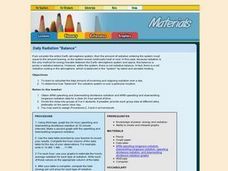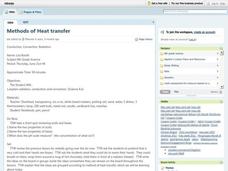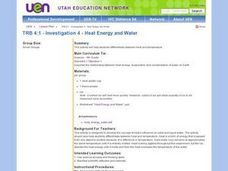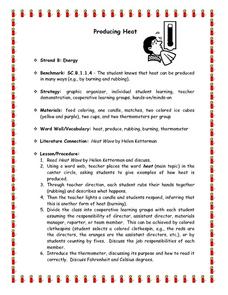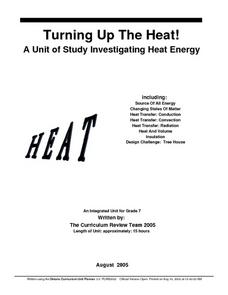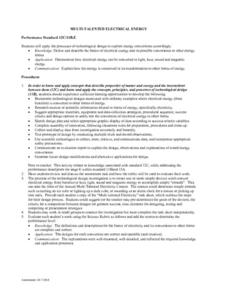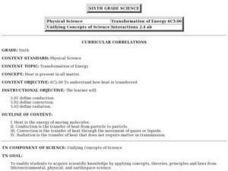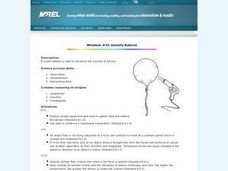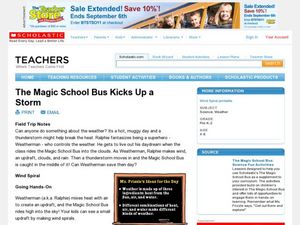Curated OER
Daily Radiation "Balance"
Students explore the amount of radiation in the Earth's atmosphere. They calculate the total amount of incoming and outgoing radiation over a day and determine how "balanced" the radiative system is over a particular location.
Curated OER
Methods of Heat Transfer
Eighth graders are introduced to the various types of heat transfer methods. After taking a quiz, they pretend their hands are cold and offer suggestions on how to warm them up. They explain each type of heat transfer method and give...
Curated OER
Heat Energy and Water
Fourth graders brainstorm the differences between heat and temperature. In groups, they determine the best way to melt ice without touching the ice. They record their observations and compare them with other groups. To end the lesson,...
Curated OER
Reaction rates and Equilibrium
Learners listen to a lecture on the collision theory. They discuss the reactant and product changes during a chemical reaction. Students are taught the factors affecting reaction rates. They complete a lab on entropy, heat and free...
Curated OER
Producing Heat
Pupils listen to "Heat Wave" by Helen Ketterman and discuss the story by creating a word web with heat as the main topic. They break into groups and conduct an experiment using a thermometer to record the temperature of melting ice cubes...
Curated OER
How Fire Burns
Learners observe teacher demonstration, discuss Fire Triangle, examine three things that fire needs to continue burning, including fuel, oxygen, and heat, and discuss how Stop, Drop, and Roll strategy is safest method of stopping...
Curated OER
Turning Up The Heat!
Students investigate the properties of heat. They explore methods of temperature control and measurement. Through experimentation and activities, students design a high tech tree house. They consider electrical, solar, and natural heat...
Curated OER
Heat and Temperature
Ninth graders explore the relationship between heat and temperature. After performing experiments, 9th graders record their observations and discuss the results. They investigate the properties of heat and explore how energy possessed...
Curated OER
Multi-Talented Electrical Energy
Students explore energy conversions by demonstrating the conversion of electrical energy into light, heat, sound, and magnetic energy. Students create a simple device that converts electrical energy from batteries to heat, light, sound...
Curated OER
Activity #13 Changing The Look of Sugar
Students observe what happens when sugar is dissolved in water and when it is heated. They weigh the products after each of the two experiments on a balance scale. Pupils distinguish between physical and chemical changes. Students are...
Curated OER
Driving Currents
Students conduct a variety of investigations to see how water, heat, and salinity affect the flow of the world's ocean currents,as well as, explore many factors that affect the flow of the world's ocean currents. They also describe in...
Curated OER
Vibrating Objects Produce Sound
Students use many different materials and resources in order to study and identify sounds that are loud or soft, high or low, pleasant or unpleasant.
Curated OER
Heat and Light Come From Various Sources
First graders study heat and light and how they come from various sources. They list sources of heat and light and identify the different energy sources as heat, light, or both heat and light.
Curated OER
Transformation of Energy: Heat
Sixth graders investigate how heat is transferred and the concepts of conduction, convection, and radiation. They define key vocabulary terms, and observe teacher-led demonstrations of conduction, convection, and radiation.
Curated OER
Energy/Light/Heat/Sound
Fourth graders study the properties of heat in this series of lessons. They discuss sources of heat and experiment to determine its properties. They identify insulators and conductors by measuring temperatures, and graphing their data....
Curated OER
Heating of Water: Water Vapour
Seventh graders read the directions printed on their worksheet and follow them carefully. They set up a beaker with a tripod and Bunsen burner under it. They record the temperature of water every 30 seconds. Students graph the data and...
Curated OER
On-line Heat Investigation
Young scholars use the Internet to find an experiment on heat. In teams, they perform the experiment along with hypothesis and solutions. They complete a form given to them by their teacher to discover the properties of heat.
Curated OER
Ice Melting
Students design investigations to test various materials to prevent heat gain in frozen water. The task assess students' knowledge of scientific inquiry including the following skills: observation, data collection, measurement,...
Curated OER
The Captain And Lake Wilmar
Tenth graders examine the ecosystem of Lake Wilmar through three coordinated performance tasks. They first investigate the effects of pH on freshwater animals by comparing the zooplankton counts from three different areas. They then...
Curated OER
How Effective is Perspiration at Cooling?
High schoolers collect data on the cooling of water in two different test tubes, one that is wrapped in wet newspaper and one in dry newspaper. They then relate this cooling effect to the body's perspiration.
Curated OER
Rate of Cooling Experiment
Ninth graders measure the insulation properties of different fabrics by immersing cans of water covered with fabric "socks" in an ice bath and measuring temperature changes. They then calculate heat loss and graph the data individually.
Curated OER
Density Balloon
Students experiment with density using a mylar balloon and hair dryer in an experimental setting. The concept of density is often confusing to students and this activity gives them an introductory insight into the concept in a fun way.
Curated OER
The Magic School Bus Kicks Up a Storm
Students investigate how warm air from a lamp affects a spiral of paper. They determine how the warm air rises while cooler air moves into take its place which creates wind in this Magic School Bus activity.
Curated OER
Do Different Colors Absorb Heat Better?
Students work together to test how the color of a material affects how much heat it absorbs. They make predictions and take notes on their observations. They discover how engineers use this type of information.


